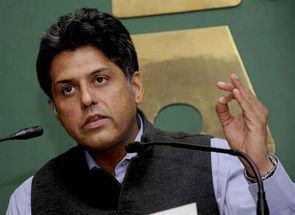 There is some kind of "misunderstanding" on the intent and purport of the ordinance on convicted lawmakers and its contour needs to be understood in entirety, Information and Broadcasting Minister Manish Tewari said in New Delhi on Friday.
There is some kind of "misunderstanding" on the intent and purport of the ordinance on convicted lawmakers and its contour needs to be understood in entirety, Information and Broadcasting Minister Manish Tewari said in New Delhi on Friday.
"I think there is some kind of misunderstanding with regard to the intent and purport of the ordinance. There is nothing which the executive has taken upon itself.”
"We have entirely left it to the discretion of courts. That if at all the courts come to this conclusion that the conviction deserves to be stayed, then under those circumstances the principles of natural justice entail that the person in question be permitted to attend the proceedings of the House," Tewari said.
He said there is a need to understand the contour of the ordinance in its entirety.
"All that the ordinance envisages is that in case a legislator is convicted by a court of law and then a superior court decides to stay that conviction, then under those circumstances, the person in question would be entitled to attend the proceedings of the House. (He will) not vote, not draw salaries or allowances," the minister said.
This is the same principle which is applied by courts with regard to election petitions which also come within the purview of the Representation of People Act, he said.
"When an election petition is filed and if the high court was to hold somebody guilty of corrupt practices and then he goes to appeal, the usual practise followed by courts is that when the conviction is stayed during pendency of the appeal, then the person in question is allowed to attend the proceedings of the House," Tewari said.
"On the substantive aspect of the ordinance, I think the intent, purport and the larger structure needs to ensure that the principle of natural justice apply equally, fairly and across the board", he said during a joint press conference with Minister of State in Prime Minister's Office V Narayanasamy.
Supporting the ordinance, cleared by Union Cabinet recently, Narayanasamy said the government has the right and authority to bring an ordinance on every issue.
"If a person is convicted by a lower court and if an appeal is filed and if the judgement is stayed by the higher court, definitely the person can contest elections. That is the practice which had prevailed earlier. Even in the election petition, if a lower court order is suspended, then the person will participate in the proceedings. And he cannot claim salary and all.”
"BJP and other parties are trying to politicise the issue. A majority of the political parties are in favour of it," Narayanasamy said.
To a question whether the ordinance will stand judicial scrutiny, Tewari said a level-playing field has been maintained within the Representation of People Act through the ordinance.
"First of all, there has to be a challenge. And if at all there is a challenge, it has to be judicially adjudicated. Now, how the judges will make up their mind, your guess is as good as mine," he said.
"Since there is a Supreme Court order, so that order has to be studied. The implications of the decision would have tobe taken cognisance of, the apex court and its judges apply themselves very diligently before they deliver the judgement, so it is equally incumbent upon us to study the fine prints very carefully and then come out with an appropriate structured response and not make off-the-cuff statements on the SC judgement", Tewari said.
Tewari suggested some of his partymen carefully go through the ordinance before disagreeing with it.
"Whoever our supporters are, we respect them. They are very intelligent. They have experience in politics. So, I will request them that they should take note of the ordinance and what is written in it," he said when asked about disagreement on the ordinance from some of his party men.
The minister said he would first read today's Supreme Court order on giving rights to citizens to reject all candidates contesting the polls and give his view.
"The Hon'ble SC applies itself to every matter before it very diligently before they deliver any judgement or order. So, it is equally incumbent upon government to apply itself equally diligently to any order which the Supreme Court has delivered.”
"So, once we have perused the order, once we have consulted with all the relevant stakeholders, if at all there is any response which needs to be articulated, we would come back to you," he added.










